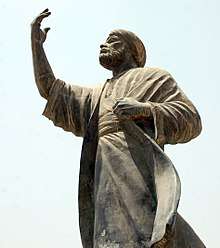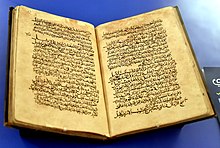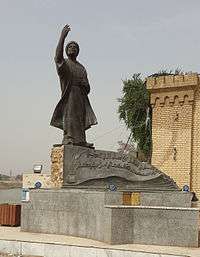Al-Mutanabbi
Abū al-Ṭayyib Aḥmad ibn Al-Ḥusayn Al-Mutanabbī Al-Kindī (أبو الطيب أحمد بن الحسين المتنبّي الكندي) (ca.915 – 23 September 965 CE) from al-Kūfah, Iraq, was a famous ‘Abbāsid Arab poet at the court of Sayf al-Dawla in Aleppo, and for whom he composed 300 folios of poetry.[1][2] [3] As one of the greatest, most prominent and influential poets in the Arabic language, much of his work has been translated into over 20 languages worldwide. His poetry largely revolves around praising the kings he visited during his lifetime. He started writing poetry when he was nine years old. He is well known for his sharp intelligence and wittiness. Al-Mutanabbi had great pride in himself through his poetry. Among the topics he discussed were courage, the philosophy of life, and the description of battles. Many of his poems were and still are widely spread in today's Arab world and are considered to be proverbial. His great talent brought him very close to many leaders of his time. He praised those leaders and kings in return for money and gifts. His poetic style earned him great popularity in his time.
Al-Mutanabbi (المتنبي) | |
|---|---|
 | |
| Born | 915 |
| Died | 23 September 965 (aged approx. 50) |
| Other names | (أبو الطيب احمد بن الحسين المتنبّي) |
| Era | Medieval era (Islamic Golden Age) |
| Region | Arab world, Muslim world |
Main interests | Arabic poetry |
Influences
| |

Childhood and Youth
Al-Mutanabbi was born in the Iraqi city of Kufah, 915. His father claimed descent from the South Arabian tribe of Banu Ju'fa.[4] His last name, Al-Kindī, was attributed to the district he was born.[5] Owing to his poetic talent, and claiming predecession of prophet Saleh, al-Mutanabbi received an education in Damascus, Syria. When Shi'ite Qarmatians sacked Kufah in 924, he joined them and lived among the Banu Kalb and other Bedouin tribes. Learning their doctrines and dialect, he had many followers, and even claimed to be a Nabi (نَـبِي, Prophet) — hence the name Al-Mutanabbi ("The Would-be Prophet") — he led a Qarmatian revolt in Syria in 932. After its suppression and two years of imprisonment by the Ikhshid governor of Hims,[6] he recanted in 935 and became a wandering poet. During this period he began writing his first known poems. Political ambition to be a Wali led al-Mutanabbi to the courts of Sayf al-Dawla and Abu al-Misk Kafur but in this ambition he failed.
Al-Mutanabbi and Sayf al-Dawla
Al-Mutanabbi lived at the time when the Abbasid Caliphate started coming apart, many of the states in the Islamic world became politically and militarily independent from the weak Abbasid Caliphate. Chief among those states was the Emirate of Aleppo.
He began to write panegyrics in the tradition established by the poets Abu Tammam and al-Buhturi. In 948 he attached himself to Sayf al-Dawla, the Hamdanid poet-prince of northern Syria. Al-Mutanabbi joined the court of Sayf al-Dawla in 948. Sayf al-Dawla was greatly concerned with fighting the Byzantine Empire in Asia minor where Al-Mutanabbi fought alongside him. During his nine years stay at Sayf al-Dawla's court, Al-Mutanabbi versified his greatest and most famous poems, he wrote in praise of his patron panegyrics that rank as masterpieces of Arabic poetry. During his stay in Aleppo, great rivalry occurred between Al-Mutanabbi and many scholars and poets in Sayf al-Dawla's court, one of those poets was Abu Firas al-Hamdani, Sayf al-Dawla's cousin. In addition, Al-Mutanabbi lost Sayf al-Dawla's favor because of his political ambition to be Wāli. The latter part of this period was clouded with intrigues and jealousies that culminated in al-Mutanabbi's leaving of Syria for Egypt, then ruled in name by the Ikhshidids.
Al-Mutanabbi in Egypt
Al-Mutanabbi joined the court of Abu al-Misk Kafur after parting ways with Saif al Dawla, but Kafur dismissed Al-Mutanabbi's intentions claiming them to be a threat to his position. Al-Mutanabbi realized that his hopes of becoming a statesman were not going to be materialized and he left Egypt in c. 960. After he left, he heavily criticized Abu al-Misk Kafur with satirical odes.
Poetry and famous sayings
Mutanabbi's egomaniacal nature seems to have got him in trouble several times and might be why he was killed. This can be seen in his poetry, which is often conceited:
- In a famous poem he speaks to the power of identity and the freedom that comes with knowing oneself.
| و أسمعت كلماتي من به صمم | أنا الذي نظر الأعمى إلى أدبي | |
| والسيف والرمح والقرطاس والقلم | الخيل والليل والبيداء تعرفني |
| ʾAnā l-ladhī naẓara l-ʾaʿmā ʾilā ʾadab-ī | Wa-ʾasmaʿat kalimāt-ī man bi-hī ṣamamu | |
| Al-ḫaylu wa-l-laylu wa-l-baydāʾu taʿrifu-nī | Wa-s-saifu wa-r-rumḥu wa-l-qirṭāsu wa-l-qalamu. |
| I am the one whose literature can be seen (even) by the blind | And whose words are heard (even) by the deaf. | |
| The steed, the night and the desert all know me | As do the sword, the spear, the paper and the pen. |
- He was also known to have said:
| فلا تظنن أن الليث يبتسم | إذا رأيت نيوب الليث بارزة |
| If you see the lion's canines | Do not think that the lion is smiling. | |
| تجري الرياح بما لا تشتهي السفن | ما كل ما يتمنى المرء يدركه |
| Not all one hopes achieves | Winds blow counter to what ships desire. | |
Death
Al-Mutanabbi was killed because one of his poems contained a great insult to a man called "Ḍabbah al-Asadī" (Arabic: ضبّة الأسدي). Dabbah, along with his uncle Fāṫik al-Asadī (Arabic: فاتك الأسدي), managed to intercept al-Mutanabbi, his son Muḥassad (محسّد), and his servant near Baghdad. Ibn Rachik reported that when al-Mutanabbi had the chance to flee, he remembered his bold verses and resolved to live up to them, fought, and died along with his companions in 965.
Legacy

Abū al-Fath ‘Uthman ibn Jinnī the grammarian (ca. 941/2—1001/2) wrote a commentary on his poetry titled Al-Fasr ('The Explanation').[n 1][7]
Notes
- Only in the MS of Al-Fihrist in the Chester Beatty Library.
References
- Nadīm (al-) 1970, p. 373.
- Nadīm (al-) 1970, p. 1066.
- Khallikān (Ibn) 1843, pp. 102-110, I.
- Hámori, András P. "al-Mutanabbī". Encyclopaedia of Islam, THREE.
- al-Mutanabī. (2005). Diwān al-Mutanabī. Bayrūt: Dār al-Jīl. ISBN 9953-78-127-3. OCLC 225423623.
- Khallikan (Ibn) 1843, p. 104, I.
- Nadīm (al-) 1970, p. 189.
Bibliography
- Owles, Eric (December 18, 2008). "Then and Now: A New Chapter for Baghdad Book Market". The New York Times. Retrieved May 19, 2010.
- Al-Khalil, S. and Makiya, K., The Monument: Art, Vulgarity, and Responsibility in Iraq, University of California Press, 1991, p. 74.
- Al-Mutanabbî, Le Livre des Sabres, choix de poèmes, présentation et traduction de Hoa Hoï Vuong & Patrick Mégarbané, Actes Sud, Sindbad, novembre 2012.
- Arberry, A. J. (trans.), Poems of al-Mutanabbi: A Selection with Introduction, Translations and Notes (London: Cambridge University Press, 1967).
- Khallikān (Ibn), Aḥmad ibn Muḥammad (1843). Wafayāt al-A’yān wa-Anbā’ Abnā’ al-Zamān (The Obituaries of Eminent Men}. I. Translated by McGuckin de Slane, William. Paris: Oriental Translation Fund of Great Britain and Ireland. pp. 102–110.CS1 maint: ref=harv (link)
- Nadīm (al), Abū al-Faraj Muḥammad ibn Isḥāq Abū Ya'qūb al-Warrāq (1970). Dodge, Bayard (ed.). The Fihrist of al-Nadim; a tenth-century survey of Muslim culture. New York & London: Columbia University Press. pp. 189, 373, 1066.CS1 maint: ref=harv (link)
- Nadīm (al-), Abū al-Faraj Muḥammad ibn Isḥāq (1872). Flügel, Gustav (ed.). Kitāb al-Fihrist (in Arabic). Leipzig: F.C.W. Vogel. p. 552 (169).CS1 maint: ref=harv (link)
- Thaʻālibī, ʻAbd al-Mālik b. Muḥ. (1847). Dieterici, Friedrich (ed.). Mutanabbi und Seifuddaula aus der Edelperle [Yatîmat al-dahr] des Tsaâlibi (in German and Arabic). Leipzig: Fr. Chr. Wilh. Vogel.CS1 maint: ref=harv (link)
- Wormhoudt, Arthur (trans.), The Diwan of Abu Tayyib Ahmad Ibn Al-Husayn Al-Mutanabbi (Kazi 2002) ISBN 9781930637382
See also
External links
| Arabic Wikisource has original text related to this article: |
